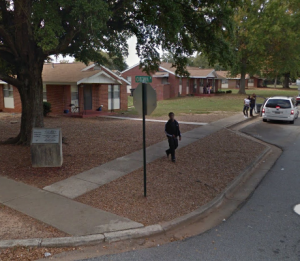
(Google Maps)
Could This Newnan Apartment Shooting Have Been Prevented, and Is Justice Available to the Family?
Gunfire erupted outside an Octavia Place apartment Wednesday night, April 4, 2018, reportedly claiming the life of 44-year-old Adrian Cantrell Sheffield.
According to The Newnan Times-Herald, an argument escalated to gunfire “outside 19 Octavia Place in a courtyard area,” shortly before 10 p.m. Tragically, Mr. Sheffield succumbed to fatal injuries at the scene. Police have since made an arrest in connection with the shooting, per AJC reports.
Was negligent security on the part of the owner or manager of this property a factor in this tragic shooting, and could this incident have been prevented? Read Our Legal Take below to find out if Adrian Cantrell Sheffield’s family may have legal avenues for justice and claims for substantial compensation in Georgia.
Our Legal Take
Apartment residents and guests have a right to feel safe and secure while on the premises. The Murray Law Firm questions the level of security provided at the subject apartment complex and whether this shooting may have been prevented.
- What security measures, such as gated-entry, fencing, bright lighting, security patrols, and surveillance cameras, were in place to protect Mr. Sheffield and deter crime at the time of the shooting?
By law, property owners in Georgia are required to protect all those legally on the premises from any foreseeable harm. Should the facts of this matter reveal that the apartment complex owner or management failed to provide adequate security, the family of Adrian Cantrell Sheffield may seek justice and elect to pursue legal claims for their loss.
The Murray Law Firm has recovered millions of dollars for victims of unsafe properties in Georgia, and recently obtained a $29.25 million dollar verdict in Georgia.
We represent our Clients on a contingency agreement, which generally means that no fees or payments are owed until and unless we recover. Anyone seeking further information or legal representation is encouraged to contact us via e-mail (click here) or by telephone at 404.842.1600. Consultations are free and confidential.
CALL NOW: 404.842.1600
Choosing the Right Attorney
Selecting the right attorney for you or your family is highly important. You must feel confident that the attorney you hire has a complete understanding of the law applicable to your particular case, and has successful experience in handling such cases.
Important: Do not hire a lawyer who has violated the Rules of Professional Conduct!!!
You should not hire an attorney who calls you or visits you unsolicited, or anyone that contacts you directly to offer legal services. This activity is strictly prohibited by Rule 7.3 of the American Bar Association (ABA) Model Rules of Professional Conduct, which states as follows:
 A LAWYER “SHALL NOT” CONTACT A PROSPECTIVE CLIENT THROUGH A “LIVE TELEPHONE” OR AN “IN-PERSON” VISIT.
A LAWYER “SHALL NOT” CONTACT A PROSPECTIVE CLIENT THROUGH A “LIVE TELEPHONE” OR AN “IN-PERSON” VISIT.
– RULE 7.3, ABA MODEL RULES OF PROFESSIONAL CONDUCT.
If an attorney, or someone acting on behalf of an attorney, contacts you in this manner, that attorney is in violation of this Rule. This unethical and unprofessional activity on the part of the lawyer is good sign that you should stay away. It is imperative that you are represented by an attorney who is capable of advocating for you within the confines of the law, and an attorney who fails to abide by the Rules of Professional Conduct is probably not the best fit. In fact, any such attorney should be immediately reported to the local State Bar Association. If you have been contacted in such an unsolicited manner, contact us and we’ll assist you in filing a report.
Contingency Fees Disclaimer: “Contingent attorneys’ fees refers only to those fees charged by attorneys for their legal services. Such fees are not permitted in all types of cases. Court costs and other additional expenses of legal action usually must be paid by the client.”
SaveSave
 Georgia Legal Report
Georgia Legal Report



